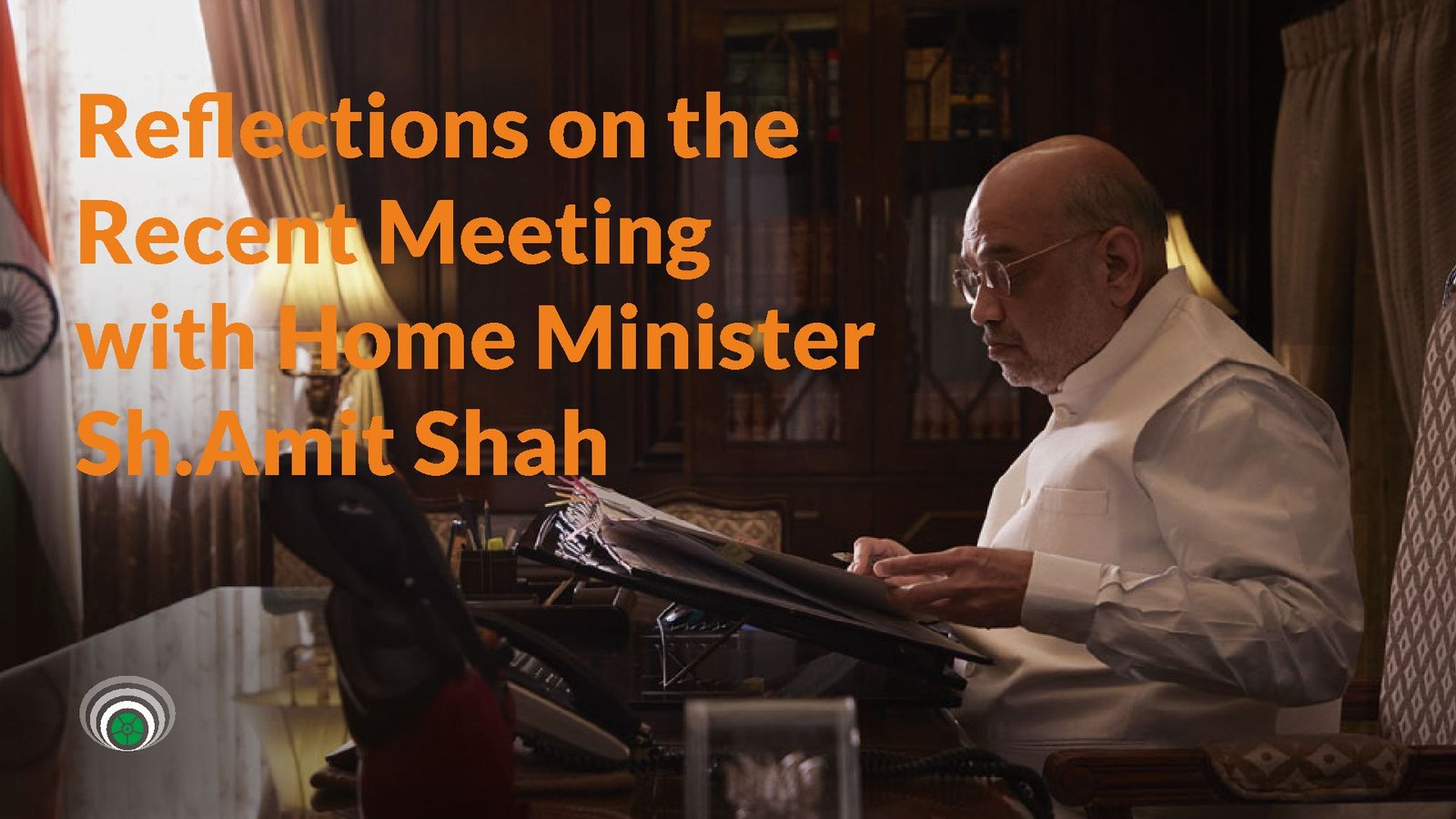
A recent meeting between Hon’ble Home Minister Shri Amit Shah and Auroville representatives highlights the close involvement of the Indian government in the Auroville’s affairs. As Auroville faces increased scrutiny, the collective must decide whether to collaborate with officials for progress or remain entrenched in outdated practices that hinder development.
On September 24th, 2024, a high-profile meeting took place between Hon’ble Home Minister Shri Amit Shah and a group of Auroville representatives. The meeting, held at the Home Minister’s residence in New Delhi, has sparked considerable discussion and speculation within the Auroville collective. The notes (link) from this conversation reveal some important insights into the government’s stance toward Auroville and the challenges the collective faces in adjusting to the changes thrust upon it in recent years.
But beyond the unofficial record, there are a number of critical observations and unanswered questions that beg further examination.
The first question that comes to mind is: Why was this meeting held at Shri Amit Shah’s residence rather than a more official setting? Was this merely a courtesy extended to a Friendly Guy (name changed for obvious reasons) due to his past history of humouring powerful figures, or does it indicate something more? If the discussion was of such importance to Auroville’s future, why wasn’t the Ministry of Education, which now oversees Auroville under the International Cooperation Cell (ICC), more formally involved?
One could argue that holding the meeting at a residence reflects a more casual, behind-the-scenes discussion rather than an official government interaction. Yet, if the matter was truly as significant as the future of Auroville, it is reasonable to expect a more formal process involving all relevant authorities. This raises questions about the actual intent and outcomes of the meeting, as well as the role that key ministries are playing—or not playing—in this ongoing saga.
Another peculiar detail from the meeting was that much of the conversation reportedly took place in Hindi. Given the linguistic demographics of the attendees, this means that only A and P were likely able to engage fully. This leaves the others as mere spectators, unless FG has picked up more Hindi than he knows about Auroville.
The choice of language might have inadvertently limited the full participation of all attendees, which raises concerns about the effectiveness of such a dialogue. When discussing the complex future of a multicultural experiment like Auroville, it seems odd that the conversation would not be in a more universally understood language. It also puts into question how much influence or contribution the other participants could have had, especially if they were relying on translations or second-hand summaries of the conversation, provided to them later.
One of the most critical revelations from this meeting was the Home Minister’s acknowledgment that the tough actions taken by the government over the past three years were deliberate and preordained. For many in Auroville, this should come as a wake-up call. These were not random or haphazard moves made by an appointed official, as many believed. Instead, they were part of a conscious strategy by the government to bring Auroville in line with Indian law and development priorities.
For years, I have been warning that Auroville must not underestimate the resolve of the Indian government. Instead of introspection and diplomacy, the collective response from Aurovilians has been largely defiant. From insulting government officials to filing numerous cases against the Government of India and rallying international media support to sully India’s image, these actions have been more often than not, counterproductive. What did we achieve? A deeper entrenchment of government authority in the affairs of Auroville?
In hindsight, inviting the Prime Minister of India to Auroville in 2017 for the 50th anniversary seems like a turning point. It’s as though a few in the collective believed he would come, say a few words, release a key to a controversial building and leave without giving much thought to the future of Auroville. But by bringing Auroville into the national spotlight, we placed ourselves firmly on India’s development agenda. Did we truly think the government would simply allow Auroville to operate as it had, without further scrutiny or involvement?
The meeting notes in the end also highlighted a continued focus on the individual occupying the post of Secretary of the Auroville Foundation, with the Home Minister stating that the phase involving tough actions was now over and the Secretary had been transferred out. However, the deeper issue remains unaddressed: It is not about who holds the seat of the Secretary but rather about Auroville’s collective inability to adjust/adapt/nudge/inspire the officials towards the original Vision for the project.
For decades, Auroville has operated at its own pace—slow, methodical, often lacking clear results in terms of development. This approach may have worked in the past, but the government will want tangible outcomes, and our resistance to this has been a key source of friction. As noted, it took Auroville 35 years to build the Matrimandir. While this is emblematic of Auroville’s unique ethos, it is unlikely to satisfy government officials who are tasked with delivering results.
If the collective remains obsessed with individual personalities like the Secretary, we will fail to see the bigger picture: Auroville will increasingly be judged on its ability to collaborate with government authorities and show progress. The Secretary is not the problem; the deeper issue is our collective reluctance to embrace change and work within the new realities that we ourselves brought upon us.
The Home Minister’s statement that the government is now ready to collaborate with Aurovilians to continue the Auroville experiment is a call to reflection. Are we, as a collective, ready to collaborate with government appointees and officials? Are we prepared to accept that the future of Auroville may not resemble its past?
The last three years have seen a struggle between two opposing visions: the government’s desire for order, structure, and progress versus Auroville’s long-standing tradition of non-conformity and slow, organic development. This is essentially a clash between the “new” and the “old,” a theme that has been part of Auroville’s history since the 1970s when the radicals of that time clashed with the SAS over control of the project.
But this time, the stakes are higher. The government’s involvement is not going away, and the sooner we realize this, the better. Collaboration does not mean relinquishing the role of RA; it means finding a way to move forward together in a way that preserves Auroville’s uniqueness while aligning with broadening national goals.
One of the most powerful statements made by the Home Minister was that Auroville would exist for another hundred or two hundred years, and that it was created by the philosophy of Sri Aurobindo. In his words, there will be no destruction of Auroville. This is a profound acknowledgment of Auroville’s importance to India and the World.
However, the subtext here is equally important: while Auroville will continue, it may do so despite the actions of its current residents. The individuals who have caused unrest, resisted change, and clung to outdated modes of operation will eventually fade from memory. Auroville will survive and thrive, but it will do so in a new form and with fresh drive.
Lastly, FG’s question about Dr. JR holding dual roles as Revenue Secretary in Gujarat and Secretary of the Auroville Foundation continues to reflect a lingering obsession with one individual. This personal vendetta has cost the collective dearly, and it’s time to move on. The focus on one person’s role detracts from the larger issues at hand. Auroville’s future depends not on ousting one official but on working with the system that is now firmly in place.
The views expressed by Hon’ble Home Minister Shri Amit Shah mark a turning point in Auroville’s relationship with the Indian government. The Home Minister’s statement about amending the Auroville Foundation Act only with the consent of Auroville residents could be a strategic hint. Those who underestimated the gravity of the situation and attended the meeting, may have been used to convey a message to Auroville. This is a bombshell revelation that should alarm the community, but instead, complacency persists. Many are too focused on preserving their own influence, either seeking total control or preparing to abandon Auroville if they can’t maintain it. The influential factions have historically placed their personal agendas above Auroville’s collective interest, and this shortsightedness could lead to significant consequences if we don’t start working with the government constructively.
While the past few years have been turbulent, the government’s willingness to collaborate offers a path forward. However, this requires the collective to adapt, embrace change, and work constructively with government officials. Auroville will continue, but it will do so in a form that is likely very different from its past. The question is whether the current residents are ready to be part of that future or whether they will remain stuck in the past, resisting the inevitable.
Lakshay Dharan





